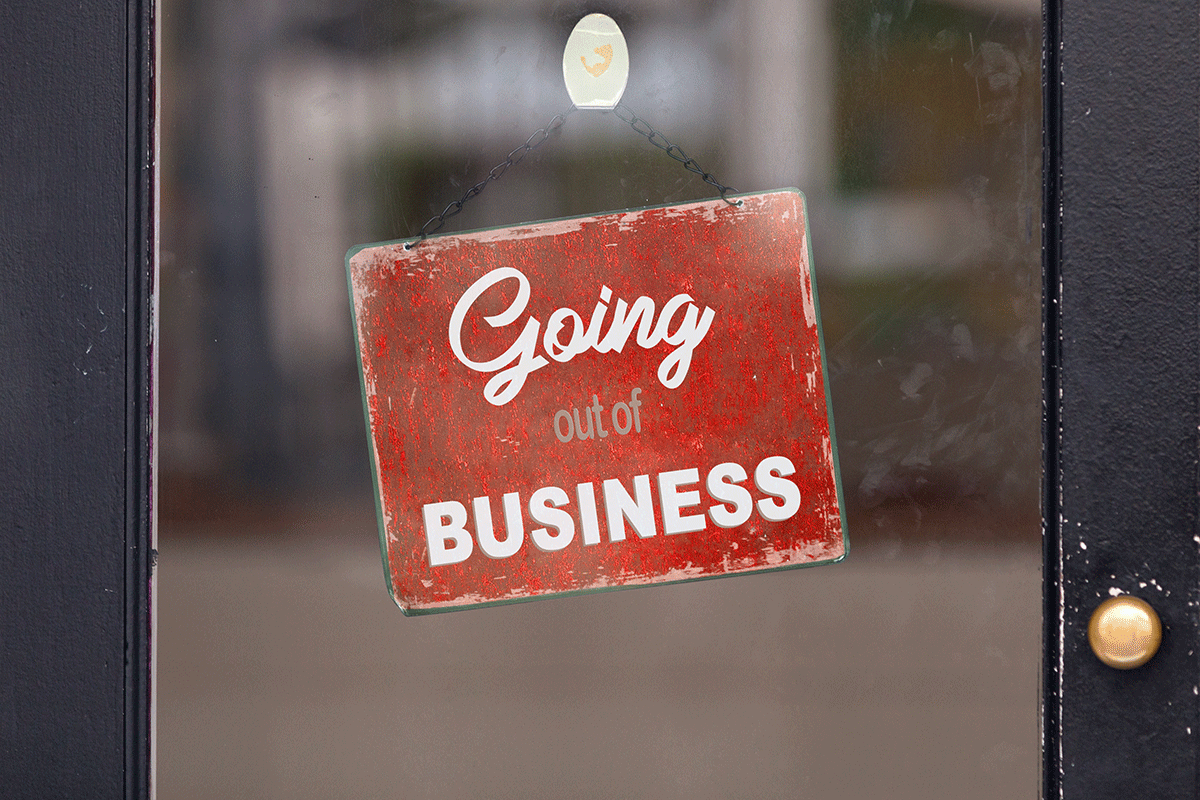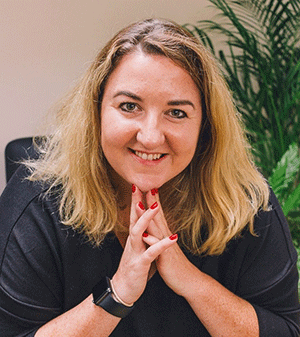'We survived and thrived after bankruptcy - here's how to do it'
With more people facing bankruptcy as a knock-on effect of the pandemic and government lockdown, we hear…
3rd June 2020 12:09
by Lily Canter from interactive investor
With more people facing bankruptcy as a knock-on effect of the pandemic and government lockdown, we hear from three entrepreneurs who decided to go bankrupt.

The coronavirus outbreak has set in motion a wave of bankruptcies across the UK as businesses have been forced to shut down.
Government bailouts to the tune of £330 billion via the small business grant fund and leisure grant fund have helped some firms stay afloat together with pay grants of up to £2,500 a month for workers and the Business Interruption Loan Scheme.
But it is still predicted that Covid-19 may bankrupt more people than it kills, with supply chains disrupted, workers self-isolating at home and consumers spending less.
Declaring yourself bankrupt as an individual can be a devastating decision to make, both financially and emotionally – but for many people it can also provide a fresh start. Here three people share their experiences of surviving – and thriving – after bankruptcy.
“It’s not the end of the world”

At the age of 20, Daniel Summerfield ran a global video game distribution company with sales of £1 million a year.
The young entrepreneur set up Mass Entertainment Limited in Bedfordshire in 2017 with just £50, after working as a sales manager in the sector.
“It went really well for a few months and I got a big loan from the bank, but it came crashing down quite quickly.
“I made a deal with a video game publisher for exclusive distribution of a game. I got £400,000 from an investor but it was a bad contract because I was a personal guarantor and he had 50% on net profit returns. It was all on his terms and the whole thing was rushed. But I thought it wouldn’t go wrong and I couldn’t see the game not selling.”
Unfortunately, on launch day the game did not work, and the error took 10 days to fix. This left Daniel with tens of thousands of units that no one wanted to buy. He ended up selling the stock at a massive loss, a move that cost him a staggering £250,000.
Daniel thought his company could fight back, but it was not possible.
At the end of 2019 he decided to liquidate the company, laying off 25 staff and declaring himself bankrupt.
Daniel, who is now 24, found the process straightforward and was fortunate enough not to own a property so he lost no personal assets. The conditions of his bankruptcy mean he cannot be a company director for 12 months or apply for any credit or finance.
He is paying off the £680 bankruptcy fee through his monthly salary, while he works as a consultant for his previous supplier.
“The process is OK,” he says. “The hardest part is the period of grief you feel afterwards. It was a really tough self-acceptance process as I have always been seen as this big business guy. Now I feel like I have failed, but what I have realised is it is not the end of the world – after 12 months my life will return.”
And he is adamant that he has learnt from the experience and will build on it.
“This experience is invaluable. I made £7 million of sales in three years and I’m so grateful I had that opportunity. It is a bitter lesson that will help me in future ventures. I’m now lining up my next project and I will have 12 months of learning, reflecting and growing.”
What is bankruptcy?
You can apply for bankruptcy yourself, or a creditor you owe at least £5,000 to can ask a court to make you bankrupt, even if you do not want them to.
This legal process writes off the debts covered by the bankruptcy. After you are discharged, normally after a year, you will only have to pay debts such as court fines and student loans.
The advantage of going bankrupt is that you can make a fresh start. The financial pressure is instantly removed: you no longer have to deal with creditors, who have to stop most types of court action against you.
You are allowed to keep certain items, such as a car if you need it to get to work, and a reasonable amount to live on.
The biggest disadvantage is that if you own your own home you may have to sell it to repay your creditors. If your income is high enough, you still need to make repayments towards your debt for three years and there is a £680 bankruptcy fee to pay.
It is also more difficult to take out credit while bankrupt and your credit rating can be affected for six years. Your bankruptcy is published publicly and could affect your job or cause your business to be closed down to sell off the assets.
The process to become bankrupt is different if you live in Scotland and Northern Ireland. See box on page 69 for full details.
“It gave me humility to be a better person”

Leaving a high-flying corporate job to set up a chain of cupcake shops in Sheffield was initially a dream come true for trained pastry chef Amanda Perry.
Within a few years, she had 150 staff and seven popular Fancie shops across the city.
“In our best year we made £1 million and we were in Vogue and on the television. We even made Louis Theroux’s wedding cake. But then the wheels fell off,” says Amanda.
The pressure of running the business led to her taking medication, which she believes was the “perfect storm” and meant she took her “eye off the ball”.
The final nail in the coffin came when she took on a shopping centre unit and followed bad advice.
“It was a unit under the staircase, and I was told I didn’t have to pay business rates. But then after 18 months we received a backdated rates bill for £50,000. We couldn’t keep up with the payments. We liquidated the company to try to keep the bits that were working, but it didn’t work, and we ended up trading insolvently. I had a personal guarantee on some loans and had to declare myself bankrupt and fully liquidate in 2014,” she explains.
Amanda not only lost her home, but also many family relationships as a number of relatives had also invested their savings in her venture.
“After something like this you really know who your friends are. It gave me a different perspective on life,” she says.
With the support of her solicitor and accountant, Amanda was taken through the bankruptcy process.
“It was amazingly easy – just an admin process. It was a few phone calls and an interview. My husband and I moved into a rented place and we drove around in a £500 Golf.”
But the emotional damage was far more difficult to cope with.
“I had some really dark times. I was on strong antidepressants and the ripples went far and wide with my family. I also had really bad local press.”
But over time she began to pick herself up, first by setting up a street food business before then starting e-commerce marketing firm Soup Agency a year ago.
“I felt like a bad person for a long time but now it feels like I am giving back by having a huge impact on people’s lives. We help small businesses grow and use social media to boost their online sales.”
Amanda’s advice to others is to be honest with yourself when things start going wrong and seek advice immediately from government-approved debt organisations, such as StepChange.
“Don’t leave it or bury your head in the sand like I did. Take action as soon as you can. I would never say I am glad it happened – it has been traumatic and affected long-lasting relationships – but it has given me the humility to be a better person and the experience to be better in business.”
Ways to pay off debt
These are the four main ways to pay off personal debt, but other options may be available, so you should always seek independent advice.
Debt Management Plan: You make one monthly payment, at a rate you can afford, to pay off all of your creditors until all debts are cleared. This can take many years.
Debt Relief Order: This is suitable for people on a low income with few assets. Your debt is frozen for a year, then written off completely if your circumstances do not change.
Individual Voluntary Arrangement: You pay back what you can afford for a set amount of time (up to six years) and anything you have not paid is written off after this time.
Bankruptcy: This writes off all debts but if you have any assets such as a property, they will be used to pay off the debt.
“Bankruptcy hadn’t crossed my mind”
Bankruptcy was a huge relief for Stephanie Buckley from Taunton in Somerset, who had been suffering for months with an undiagnosed underactive thyroid.
The problems began for the economic development manager when she started waking up exhausted and noticed her hair was falling out.
“I started to get really bad anxiety and felt like I couldn’t leave the house. My memory was poor, and I was anxious about holding conversations,” she explains.
Stephanie was prescribed antidepressants by her GP, but they didn’t help. She felt as if she was living “in a weird dream bubble” and not tackling her problems.
At the time, she was working for the local authority in Taunton, Somerset, but she had to take time off work. This meant she was unable to keep up with repayments on a £16,000 loan she had taken out to study in the US.
“I had sick pay and then I moved on to statutory sick pay. I used credit cards to pay the student loans and then I couldn’t pay off the credit cards. The bank was ringing me all the time and constantly hassling me.”
It was not until she met her future husband, Gareth, at a social event that she realised bankruptcy was an option.
“It hadn’t crossed my mind, but he was an insolvency practitioner and said there was no shame in it, that it was just a process to follow.”
Taking his advice, Stephanie applied for bankruptcy.
“I filled out all the paperwork and the judge didn’t even call me in to see me. It was like a huge burden was lifted – the phone calls stopped and I could start to think about what was next, which was my health.”
Stephanie started researching her symptoms and realised she had a condition called hypothyroidism.
“I found a doctor who told me to try thyroid medication and within weeks I was back to normal. Previously, I had been diagnosed with chronic fatigue and told I would never work again.”
After filing for bankruptcy, Stephanie completed a postgraduate degree in education and took on a training job in the NHS.
“The hardest part of bankruptcy is not being able to rent. I was lucky I had family to live with. But I was able to work straightaway.”
A few years later, she decided to set up The Insolvency Company, in Taunton, with her husband.
“Our youngest daughter had encephalitis when she was three and lost the ability to walk and sit up. She recovered but it could have ended up with us going bankrupt as a couple because all we cared about was our daughter. We had a wake-up call and decided we needed to move closer to family.”
The couple, who now have four children, set up the business in July 2018 and are on course to turn over £250,000 this financial year. Their aim is to remove the stigma associated with business failure.
“Because I have been through this, I have that empathy and understanding, which is really important. We are putting what we went through to good use. No one sets out to end up bankrupt. These things happen to good people.
“I think we will see an increase in business, but this is not what we wanted. We are doing loads of free work to help friends and family through this and giving a percentage of our profits to the MSE charity, which gives grants to non-profit organisations helping people to manage money.”
Where to get personal bankruptcy help
Northern Ireland
Scotland: Accountant in Bankruptcy
The process is different for business debt and bankruptcy. To find out more, visit the Government website.
This article was originally published in our sister magazine Moneywise, which ceased publication in August 2020.
These articles are provided for information purposes only. Occasionally, an opinion about whether to buy or sell a specific investment may be provided by third parties. The content is not intended to be a personal recommendation to buy or sell any financial instrument or product, or to adopt any investment strategy as it is not provided based on an assessment of your investing knowledge and experience, your financial situation or your investment objectives. The value of your investments, and the income derived from them, may go down as well as up. You may not get back all the money that you invest. The investments referred to in this article may not be suitable for all investors, and if in doubt, an investor should seek advice from a qualified investment adviser.
Full performance can be found on the company or index summary page on the interactive investor website. Simply click on the company's or index name highlighted in the article.